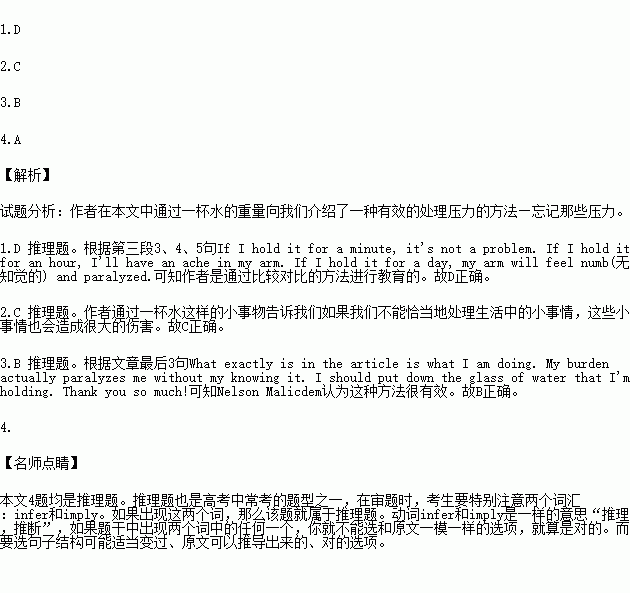题目内容
A mental professor walked around a room while teaching stress management to an audience. As she raised a glass of water, everyone expected they'd be asked the "half empty or half full" question. Instead, with a smile on her face, she inquired(询问): "How heavy is this glass of water?"
Different answers called out from the audience.
She replied, "The absolute weight doesn't matter. It depends on how long I hold it. If I hold it for a minute, it's not a problem. If I hold it for an hour, I'll have an ache in my arm. If I hold it for a day, my arm will feel numb(无知觉的) and paralyzed. In each case, the weight of the glass doesn't change, but the longer I hold it, the heavier it becomes."
She continued, "The stress and worries in life are like that glass of water. Think about them for a while and nothing happens. Think about them a bit longer and they begin to hurt. And if you think about them all day long, you will feel paralyzed--incapable of doing anything."
It's important to remember to let go of your stress. As early in the evening as you can, put all your burdens down. Don't carry them through the evening and into the night. Remember to put the glass down!
Comments
Aye Chan Aung---October 27, 2015 at 11:37 am
Short but valuable! It has clearly taught me how to deal with stress.
Nelson Malicdem--October 28, 2015 at 8:23 pm
Wow! Thanks to the author and to the one who submitted this article. I am experiencing a challenge, as I read this it gives me peace. What exactly is in the article is what I am doing. My burden actually paralyzes me without my knowing it. I should put down the glass of water that I'm holding. Thank you so much!
1.The professor tells a lesson by ________.
A. asking a surprising question
B. giving proper examples
C. imagining a situation
D. making a comparison(比较)
2. From what the professor says, we can know a small problem _________.
A. can result in a complete failure
B. is seldom taken seriously
C. can cause much stress
D. seldom causes real problems
3. From the two comments, we can know that ________.
A. Nelson Malicdem expresses thanks to the professor
B. Nelson Malicdem thinks the story is meaningful
C. Aye Chan Aung is suffering from heavy stress
D.Aye Chan Aung complains the story is too short
4.Where can we most probably read the passage?
A. On a health website.
B. On a high school website.
C. In a magazine for teenagers.
D. In a textbook about mental health.
 名校课堂系列答案
名校课堂系列答案
